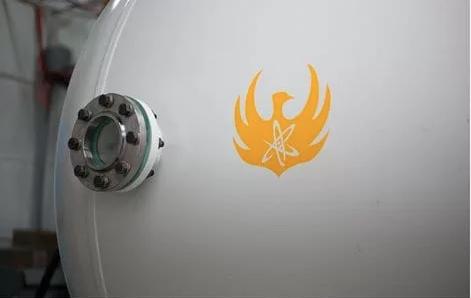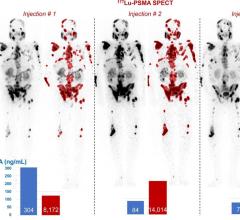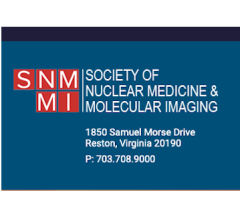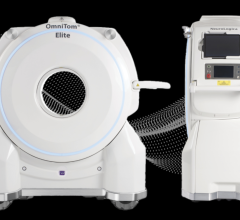
October 28, 2019 — Phoenix LLC and Shine Medical Technologies LLC, nuclear technology companies focused on near-term fusion applications and medical isotope production, announced in early October the achievement of a new world record for a nuclear fusion reaction in a steady-state system, the strongest of its kind ever produced on Earth. The reaction yielded 46 trillion (4.6 x 1,013) neutrons per second, eclipsing the previous record by nearly 25 percent and setting a new standard for neutron generator technology that is expected to enable further advances in medicine, manufacturing and clean energy.
The world record was achieved in late July during a demonstration of Phoenix’s third-generation gas-target neutron generator as part of the companies’ ongoing preparation for full-scale operation of the medical isotope production facility being built by Shine. The previous steady-state fusion record was held by the Rotating Target Neutron Source II facility in Livermore, Calif., which operated from 1978 to 1987. It produced a maximum output of 37 trillion (3.7 x 1,013) neutrons per second.
The record-setting fusion reaction followed a demonstration in June of the neutron generator, during which Phoenix and Shine ran a 132-hour (5.5 days) test with more than 99 percent uptime. These successful tests validated the performance and reliability of the Phoenix neutron generator technology that will drive Shines’s production of molybdenum-99 (Mo-99) and other isotopes. Shine anticipates that isotope production will begin in 2021.
“This achievement of producing the strongest sustained nuclear fusion reaction ever created by humans cements Phoenix’s status as the world leader in fusion neutron generation technology,” said Ross Radel, CEO of Phoenix. “The positive impacts that this now fully-proven technology will have to our customers like SHINE in health care and others working to develop 100-percent clean and abundant fusion energy are tremendous. I could not be prouder of our extremely dedicated team that has worked for over a decade to achieve this result.”
Since 2005, the two companies have operated under the mission established by Dr. Greg Piefer, Shine’s CEO and founder, and the founder and former CEO of Phoenix, to use fusion technology to solve near-term problems caused by limited accessibility to nuclear reactors for applications such as medical isotope production, non-destructive testing and materials research with the long-term vision using those innovations to further fusion science to make the world a better place.
“The world-record proves the accelerator technology is suitable to produce medical isotopes at the scale required to support a robust business case,” Piefer said. “It is also a steppingstone toward advancing fusion for other, more ambitious applications, including the recycling of nuclear waste and ultimately the creation of cleaner, safer and more abundant energy.”
Shine’s facility will integrate eight Phoenix systems to drive Shine’s Mo-99 production, which could eliminate the use of reactor facilities, while removing weapons-grade uranium from the world by using uranium that’s been made safe by the federal government as a consumable in its process.
Once operations begin, Shine will be capable of producing enough isotopes to satisfy one-third of global demand. Chronic global shortages routinely and significantly affect the diagnosis and treatment of patients around the world. This new source of Mo-99 is projected to improve the lives of more than 1 billion people during the next 50 years.
Torion Plasma Corp. provided expertise on tritium gas handling, an important element of neutron generation by the system.
The Need for Medical Isotopes
Medical isotopes are radioisotopes that are used in the diagnosis and treatment of disease. Molybdenum-99 (Mo-99) is a radioisotope that decays into the diagnostic imaging agent technetium 99m (Tc-99m). The workhorse of nuclear medicine, Tc-99m is used in more than 40 million medical imaging procedures each year, primarily in stress tests to diagnose heart disease and to stage cases of cancer. SHINE was founded to deploy a safe, cost-effective, and environmentally-friendly technology to produce a variety of medical isotopes, including Mo‑99. Roughly one percent of all Mo-99 in the world decays every hour, meaning it must be produced continuously. Current production is limited to only a handful of government-owned nuclear research reactors, the majority of which are overseas.
For more information: phoenixwi.com, shinemed.com
Related Shine Isotope Production News:
Shine Medical Approved to Build Domestic Molybdenum-99 Production Facility
BGN Technologies Introduces Novel Medical Imaging Radioisotope Production Method
Shine Medical Technologies Breaks Ground on U.S. Medical Isotope Production Facility


 February 03, 2026
February 03, 2026 









